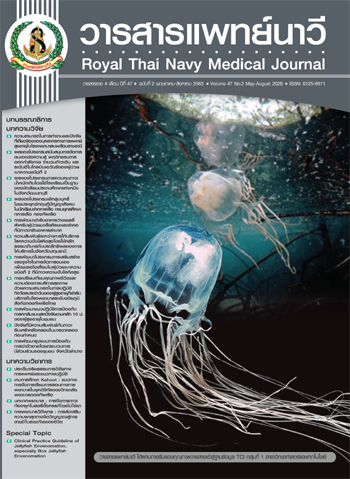ผลของโปรแกรมเลิกสูบบุหรี่โดยประยุกต์ทฤษฎีปัญญาสังคมในนักเรียนจ่าทหารเรือ กรมยุทธศึกษาทหารเรือ กองทัพเรือ
Main Article Content
บทคัดย่อ
การวิจัยกึ่งทดลองครั้งนี้ มีวัตถุประสงค์เพื่อศึกษาผลของโปรแกรมเลิกสูบบุหรี่โดยประยุกต์ทฤษฎีปัญญาสังคม กลุ่มตัวอย่างเป็นนักเรียนจ่าทหารเรือ กรมยุทธศึกษาทหารเรือ กองทัพเรือ ที่สูบบุหรี่ปัจจุบันและมีความพร้อมเลิกสูบบุหรี่ในขั้นเตรียมตัวปฏิบัติ แบ่งเป็นกลุ่มทดลองและกลุ่มควบคุม กลุ่มละ 34 คน รวมจำนวน 68 คน ระยะเวลาในการศึกษา 8 สัปดาห์ กลุ่มทดลองได้รับโปรแกรมเลิกสูบบุหรี่โดยประยุกต์ทฤษฎีปัญญาสังคม ประกอบด้วย การปรับเปลี่ยนสิ่งแวดล้อมทั้งทางกายภาพและสังคมให้เอื้อต่อการไม่สูบบุหรี่ การให้ความรู้และฝึกทักษะการเลิกสูบบุหรี่ สร้างการรับรู้ความสามารถตนเองในการเลิกสูบบุหรี่ และความคาดหวังในผลของการเลิกสูบบุหรี่ กลุ่มควบคุมได้รับการให้ความรู้เกี่ยวกับโทษพิษภัยของการสูบบุหรี่และการเลิกสูบบุหรี่ เก็บข้อมูลด้วยแบบสอบถาม 3 ช่วงเวลา ได้แก่ ก่อนการทดลอง และหลังการทดลองในสัปดาห์ที่ 4 และ 8 วิเคราะห์ข้อมูลด้วยสถิติเชิงพรรณนา ได้แก่ ความถี่ ร้อยละ ค่าเฉลี่ย และส่วนเบี่ยงเบนมาตรฐาน และสถิติเชิงอนุมาน ได้แก่ Chi-square, Independent t-test, Z-test และ Repeated measures ANOVA
ผลการศึกษา พบว่า หลังการทดลองในสัปดาห์ที่ 4 และ 8 กลุ่มทดลอง มีความรู้เกี่ยวกับการเลิกสูบบุหรี่ การรับรู้ความสามารถตนเองในการเลิกสูบบุหรี่ ความคาดหวังในผลของการเลิกสูบบุหรี่ และสามารถเลิกสูบบุหรี่ได้ต่อเนื่องมากกว่า 7 วัน ดีกว่าก่อนการทดลอง และดีกว่ากลุ่มควบคุม อย่างมีนัยสำคัญทางสถิติ (p < .001) ซึ่งพบว่า กลุ่มทดลองเลิกสูบบุหรี่ได้ จำนวน 21 คน (ร้อยละ 61.8) ในสัปดาห์ที่ 4 และเลิกสูบบุหรี่เพิ่มขึ้นอีก 7 คน ในสัปดาห์ที่ 8 รวมจำนวนคนที่เลิกสูบบุหรี่ได้ทั้งสิ้น 28 คน (ร้อยละ 82.4) ส่วนกลุ่มควบคุม เลิกสูบบุหรี่ได้ 2 คน (ร้อยละ 5.9) ในสัปดาห์ที่ 4 และเลิกต่อเนื่องจนถึงสัปดาห์ที่ 8 เมื่อเปรียบเทียบสัดส่วนของการเลิกสูบบุหรี่ทั้ง 2 ช่วงเวลา พบว่า กลุ่มทดลองมีสัดส่วนการเลิกสูบบุหรี่มากกว่ากลุ่มควบคุม อย่างมีนัยสำคัญทางสถิติ (Z < .001) ดังนั้นโปรแกรมเลิกสูบบุหรี่โดยประยุกต์ทฤษฎีปัญญาสังคมนี้สามารถนำไปประยุกต์ใช้ช่วยเลิกบุหรี่ให้กับนักเรียนจ่าทหารเรือ รวมถึงโรงเรียนจ่าทหารในเหล่าทัพอื่นๆ
Article Details

อนุญาตภายใต้เงื่อนไข Creative Commons Attribution-NonCommercial-NoDerivatives 4.0 International License.
เอกสารอ้างอิง
2. World Health Organization. Top 10 causes of death worldwide in 2018. [Internet]. [cited 2020 March 9]. Available from: https://www.who.int/news-room/fact-sheets/detail/the-top-10-causes-of-death
3. World Health Organization. Framework convention on tobacco control defines tobacco products as “products entirely or partly made of the leaf tobacco as raw material which are manufactured to be used for smoking, sucking, chewing or snuffing” in 2019. [Internet]. [cited 2020 March 9]. Available from: https://www.who.int/news-room/fact-sheets/detail/tobacco
4. Centers for Disease Control and Prevention. Cigarette smoking among adults and trends in smoking cessation - United States, 2008. MMWR Morb Mortal Wkly Rep 2009 Nov 13;58(44):1227-32.
5. U.S. Department of Health and Human Services. The health consequences of smoking-50 years of progress: a report of the surgeon general. Atlanta: Centers for Disease Control and Prevention, National Center for Chronic Disease Prevention and Health Promotion, Office on Smoking and Health; 2010.
6. World Health Organization. Stop tobacco industry interference on world no tobacco day 2012 [Internet]. [cited 2020 March 9]. Available from: http://www. who.int/mediacentre/news/releases/2012/tobacco_20120530/en
7. SMOKE FREE ZONE. Tobacco and youth (Data center). [Internet]. [cited 2020 March 9]. Available from: http:// www.ashthailand.or.th/en/youth.php (in Thai).
8. Preechawong S, Wongsaita N, Taweepatana H, Kaewkham S. A Review of studies related to smoking in high schools. Journal of Health Education 2014;37(128):15-28. (in Thai).
9. National Statistical Office. Executive summary: the smoking and drinking behavior survey 2017. Bangkok: Pimdeekarnpim; 2017. (in Thai).
10. Information section, Medical Information Division, Naval Medical Department. Annual health examination statistics of Navy personnel 2018. Bangkok: Naval Medical Department; 2018. (in Thai).
11. Chloseda A, Leerapan P, Kengganpanich M, Kengganpanich T. Smoking behavior responses to the tobacco consumption control policy of the Thai in Naval Rating school. Journal of Tobacco Control (Thailand) 2008;2(1):34-49. (in Thai).
12. Raya P, Benjakul S, Kengganpanich M, Kengganpanich T. Effects of a the smoking cessation program applying Transtheoretical model among smokers at Wanwon Sub-district, Kantang District, Trang Province. Journal of Boromarajonani College of Nursing, Bangkok 2015;31(2):9-25. (in Thai).
13. Pantaewan P, Prasittivatechakod A. Application of transtheoretical model and smoking behavior modification. Journal of The Royal Thai Army Nurses 2014;15(1):36-44. (in Thai).
14. Sawang W, Subwirapakon W. Self-management group counseling to reduce smoking behavior of Naval Rating student. Journal of Education and Social Development 2011;7(2):85-99. (in Thai).
15. Kleebpratoom P, Benjakul S, Kengganpanich M, Kengganpanich T. Efects of the smoking cessation program for quit smoking behavior among smokers at Bangkaew subdistrict, Mung Angthong. Veridian E-Journal Science and Technology Silpakorn University 2016;3(4):30-43. (in Thai).
16. Sangkaew P, Kengganpanich M, Kengganpanich T, Benjakul S, Neelapaichit N. An assessment of smoking behavior among workers in a public hospital in Bangkok Metropolitan. Journal of Health Education 2015;38(130):4-16. (in Thai).
17. Chaisalee W, Benjakul S, Kengganpanich M, Kengganpanich T. Effects of promoting smoking cessation program in drug dependence disorder patients at a hospital in Songkhla province. Journal of Public Health 2017;47(2):164-7. (in Thai).
18. Bandura A. Social cognitive theory. In: Vasta R, editor. Annals of child development. Vol.6. Six theories of child development Greenwich, CT: JAI Press; 1989. p. 1-60.
19. Naval Medical Department. Strategic plan 2016-2019, Naval Medical Department. [Internet]. [cited 2019 March 9]. Available from: https://www.nmd.go.th/ (in Thai).
20. Prochaska JO, Norcross JC, Diclemente CC. Changing for good : a revolutionary six-stage program for overcoming bad habits and moving your life positively forward. New York: Harper Collins Publishers; 2006.
21. Shein-Chung C, Jun S, Hansheng W. Sample size calculation in clinical research. 2nd ed. New York: Marcel Dekker Inc; 2008.
22. Chouinard M, Robichaud S. The effectiveness of a nursing inpatient smoking cessation program in individuals with cardiovascular disease. Nurs Res 2005;54(4):243-54.


